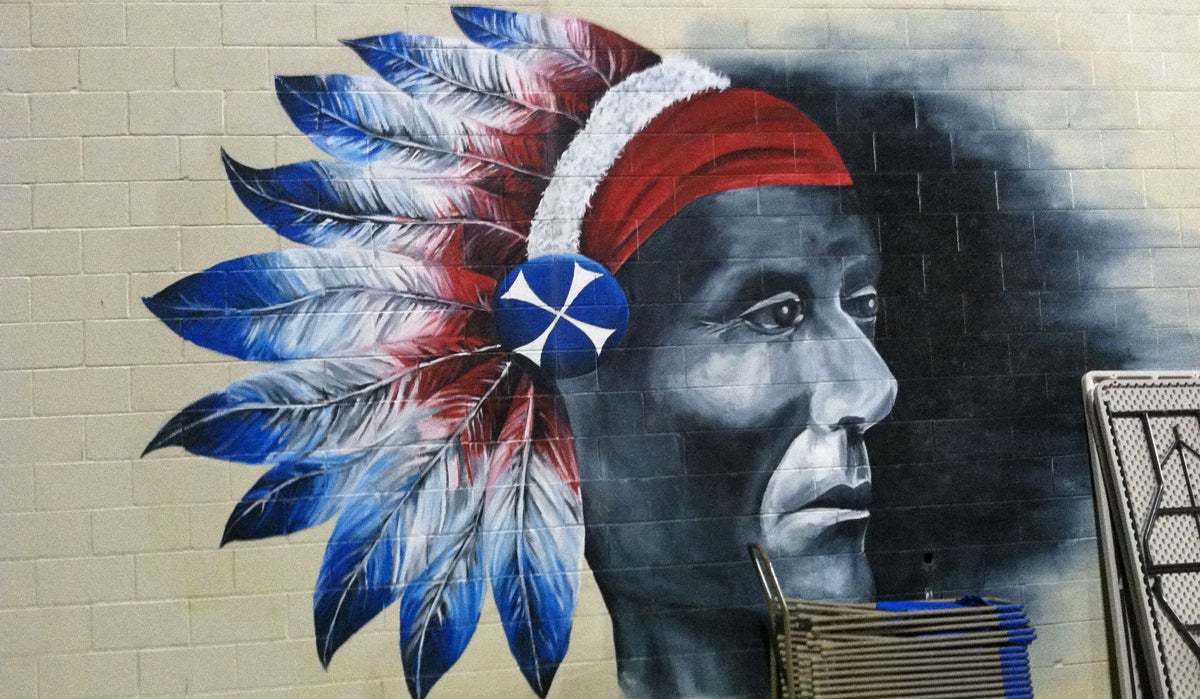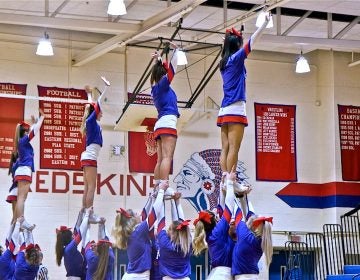Pa. commission to rule on Neshaminy ‘Redskins’ team name
A ruling expected Monday by the Pennsylvania Human Relations Commission could end a long-simmering local debate that’s made national headlines.

A mural of the Neshaminy High School mascot. (Eugene Sonn/WHYY)
The Facebook logo for Neshaminy High School’s football team features a helmet stamped with the profile of a Native American warrior and the squad’s decades-old nickname: “Skins.”
Come Monday, a highly anticipated ruling by a state commission could spell the end for the controversial combo.
Four years after it first filed suit, the Pennsylvania Human Relations Commission is expected to decide whether the Neshaminy School District can continue using the word “Redskins” to describe its sports teams. The commission says the term — axed by dozens of other schools across the country — is a racial epithet that discriminates against Native Americans and creates a “hostile educational environment” for students.
“It’s not only racial and insensitive, it’s polarizing,” executive director Chad Dion Lassiter said earlier this year.
The Bucks County district, home to more than 9,400 students, declined to comment, but it has denied the commission’s allegations in the past, calling them “unfounded.”
Either side can appeal the commission’s ruling to Commonwealth Court.
Monday’s decision comes nearly a year after a weeklong public hearing that pitted parents, former students, and teachers against school administrators and district experts, who argued the school’s mascot is rooted in pride, not prejudice.
During his testimony in January, Andre Billeaudeaux, a member of the Native American Guardians Association, said the word “redskins” is a reference to warriors who painted their faces and bodies before battle using a plant called bloodroot. He said the warriors called themselves redskins.
“It should be treated as a living tradition. It should be treated objectively,” said Billeaudeaux, who is not Native American.
Langhorne parent Donna Fann-Boyle, who is of Cherokee descent, countered with some history of her own, telling a hearing examiner that the term ties back to white settlers, who used it to describe body parts taken for bounty “in the extermination process of native people to obtain land.”
She said Neshaminy students have been “indoctrinated” to see the word in a positive light.
In 2013, when one of her sons was a freshman at Neshaminy High School, Fann-Boyle filed a complaint with the commission with hopes of getting the district to find a new name for its sports teams.
The same year, a group of student newspaper editors at the high school announced The Playwickian would no longer publish the words “Redskins” in its pages because they deemed the word racially insensitive.
The decision sparked a contentious battle with school officials that made national headlines.
The paper’s faculty adviser was suspended for two days without pay. Gillian McGoldrick, then the paper’s editor-in-chief, was suspended from the top post for a month.
While testifying, McGoldrick said the student-led ban drew criticism from fellow students and parents, some of whom posted hostile opinions of her on social media.
“There were definitely times I really didn’t want to go to school,” said McGoldrick. “I was always anxious or on edge.”
In response to the student-led ban, the Neshaminy School Board passed a policy that barred editors from removing “Redskins” from op-eds but allowed them to keep it out of news articles.
The commission sued the district in 2015, after Fann-Boyle voluntarily withdrew her complaint, but not before the commission ruled it had probable cause.
Other schools, including some in Texas and Washington state, have replaced the same mascot, but reached the decision at the district or school board level without a legal proceeding.
Dion Lassiter, the commission’s executive director, said no matter the outcome in the Neshaminy case, he hopes it can be a catalyst for “healing on all sides.”
“This has been a long, protracted development. It’s going to be great to bring some sort of closure to it,” said Dion Lassiter.
WHYY is your source for fact-based, in-depth journalism and information. As a nonprofit organization, we rely on financial support from readers like you. Please give today.




